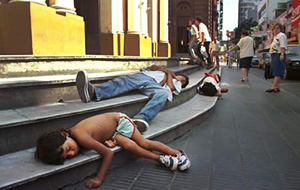 |
 |
 |
 Editorials | At Issue | August 2006 Editorials | At Issue | August 2006  
Mexico's Wealth Divide Keeps Kids on Street
 Catherine Bremer - Reuters Catherine Bremer - Reuters


| | Charity workers blame poor education, a lack of welfare and a scarcity of new jobs for the stream of children onto the street. |
When night falls, 34-year-old Ernesto Portillo takes a bag of toy cars, board games and sweets, jumps on his moped and weaves through the dark streets of the colonial Mexican city of Puebla.

An unconventional charity worker, his job is to roam around trying to befriend the scrawny kids as young as 6 who live under the city's bridges and squat in open-air market stalls.

In 10 years, Portillo has got some 200 kids off the street and into care. He has also been chased off, taunted by drunks, called a pervert and threatened by a terrified 11-year-old boy wielding a rock.

"It's difficult work. At the start I often wanted to quit," Portillo said over a coffee in Puebla's Zocalo square, where grubby children sell candy and beg from tourists.

"But I get about 20 kids a year off the street. It's a very emotional thing. I love it. It's a passion."

Charities like JUCONI, which Portillo represents, are working across the developing world, from Nairobi to Rio de Janeiro to pull children out of a life of violence, fear and addiction to brain-damaging solvents.

But many wonder what they are still doing in Mexico, the world's 13th-biggest economy, thanks to oil and tourism, a member of the OECD club of industrialized nations and boasting the highest per-capita income in Latin America.

Half a century after Spain's Luis Bunuel shot his harrowing movie "Los Olvidados" ("The Forgotten Ones") about delinquent Mexican street kids, the country has grown rich enough to be overlooked by most philanthropists. But its yawning wealth gap means gangs of kids still run wild and even die on the street.

Perpetuating the problem are low tax rates that translate into meager funding for social services, and weak job creation.

"Mexico is considered rich enough not to need foreign aid. The country should be perfectly well off. We shouldn't have to be doing this," said Miguel Angel de la Vega, who helps run a shelter for street kids on a farm outside Puebla.

"Chile has hardly any street kids. Why does Mexico? There's no reduction of poverty here. Governments come and go and life goes on the same."

DEPRIVATION

A bruising, still unresolved, presidential election battle between a well-heeled conservative and a fiery anti-poverty crusader has divided Mexicans and highlighted the country's failure to narrow the gap between rich and poor.

While one in five Mexicans can't afford to eat properly, millionaires hop about by helicopter. Many pay little tax.

The business class has blossomed on trade with the United States, but countless Mexicans were plunged into poverty by financial crises in 1982 and 1994. Millions of men have migrated to the United States, leaving broken homes behind.

The most conservative studies say 95,000 children work on Mexico's streets and 2,200 sleep there too. Among those, some 20,000 sell themselves to pedophiles.

"Once I found a 6-year-old from a village two hours away wandering around the bus station," Portillo said.

"We found his home, but his mother is an alcoholic and a prostitute and didn't want him back. There's no father and she couldn't afford to feed him."

Leftist Andres Manuel Lopez Obrador, who is challenging conservative Felipe Calderon's narrow election win, is on a quest to help the poor. With the vote so close, Calderon is promising a full attack on poverty as president.

Charity workers blame poor education, a lack of welfare and a scarcity of new jobs for the stream of children onto the street. Once there, most get hooked on inhaling solvents. Some cut themselves. All are stunted physically and intellectually.

"When I find them they are thin, very small and suffer from a deprivation of everything," said Portillo.

BURNS, SCARS

One boy, who still crawls under tables when scared, tried to hit Portillo with a rock when he showed him photos of a brightly decorated charity home which provides street kids with beds, education, team sports and psychological care.

Some kids Portillo finds have burns from accidents suffered when juggling fire at traffic lights for change. One boy had a sexually transmitted disease that had festered so long he could barely walk. Another had scars from where his parents beat him and stubbed out cigarettes on his tongue.

One teen-ager he met was left for dead as a tiny baby, after an ax his mother was using to chop down trees flew off its handle and landed in his forehead, destroying an eye.

"The problem isn't just money, it's ignorance. It's a vicious circle," said Travis Ning at the JUCONI charity, which tries to reunite kids with their families eventually.

A short drive from Puebla is de la Vega's idyllic shelter, where ruddy former street kids milk goats beneath snow-capped volcanoes and make cheese to help pay for their keep.

Most go on to live normal lives. But the ghosts of the street remain -- the kids clam up if asked about their past.

"I had problems in my family. I'm happier here," said 13-year-old Isaias, wearing his apron from the dairy and staring down at his white rubber boots.

Charities here are miserably underfunded, but they try to break the cycle of ignorance that leaves children homeless.

Antonio Diaz, a 27-year-old former street kid who, Ernesto befriended 10 years ago, is still washing windshields for a living, but is off drugs, married and renting a one-room apartment.

"My dad was a drug addict. My mother was a prostitute. I wanted another life," he said. "I already know I won't let my kids end up on the street." | 
 | |
 |



